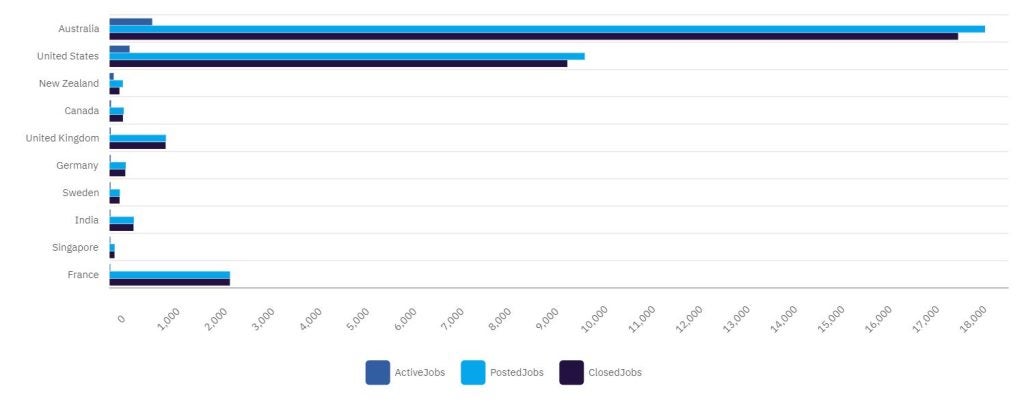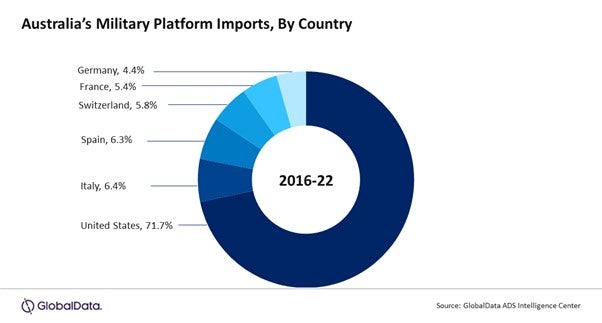Australia's strategic shift towards self-reliance in defence manufacturing has witnessed success, focusing on collaboration with Western companies to bolster domestic production.
According to insights from GlobalData, a leading data and analytics company, the move reduces imports and strengthens the Oceanic country's access to defence technologies.
Australia's drive for self-reliance in defence manufacturing has marked a turning point in the nation's strategic outlook. Over the past few years, the Australian Government's emphasis on promoting domestic defence manufacturing has yielded results, reducing the country's import dependence.
Made in Australia
As per GlobalData's latest Defense Platform Import/Export Dashboard, most of Australia's defence platforms, including military land vehicles, artillery systems and naval vessels, are now proudly marked "Made in Australia". The government's approach has culminated in establishing a defence manufacturing sector that caters to domestic needs but also holds the promise of international export.
The Australian Government is making Western technologies a cornerstone of its strategy to achieve self-reliance in defence manufacturing. GlobalData reveals that this approach has shifted the nation's defence landscape.
The US emerged as Australia's principal partner in this endeavour, contributing to approximately 71.7% of the import value for defence platforms in 2016–22. The partnership between Australia and the US projects a promising outlook for the coming decade, with the US expected to export $33.8bn (A$53.47bn) worth of defence platforms to Australia between 2023 and 2033.
These platforms include a spectrum of defence technologies, from Virginia-class submarines to MQ-4C Triton UAVs, UH-60M and MH-60R helicopters, and C-130J aircraft.
The job analytics data, extracted from GlobalData's Job Analytics database over the past four years, paints a vivid picture of the dynamic employment landscape within the aerospace, defence and security industries.
In a testament to Australia's commitment to self-reliance in defence, the nation displays a robust 18,483 active jobs, significantly outnumbering the jobs closed at 17,915. Meanwhile, Australia's key partner in this endeavour, the US, features prominently, with 10,026 jobs posted and 9,658 closed, reaffirming the depth of collaboration.

Sai Kiran, aerospace and defence analyst at GlobalData, notes: "Australia's geographical proximity to the Indo-Pacific region, coupled with its crucial role in countering China's aggression, has solidified its partnership with the United States.
"This strategic alliance has led to an influx of US-based defence companies in Australia, facilitating easy access to local weapons production. Notably, this approach supports Australia's broader vision of self-reliance in the defence sector while reducing the risks associated with logistic challenges during emergencies."
Foreign companies in Australia
While Australia has achieved self-sufficiency in several defence sectors, it still relies on certain imports. Platforms like military fixed-wing aircraft, military rotorcraft, UAVs and submarines are among the products that continue to be sourced from other countries including the France, Germany, Italy, Spain, Switzerland and the US.

Kiran concludes: "Australia's push for self-reliance extends to defence companies from other NATO countries, which have established bases in the country with significant support from the local government.
"An illustrative example is the recent A$220m investment by the Australian government in two munition plants operated by Thales Australia, a subsidiary of the French defence company Thales Group, aligning closely with Australia's defence priorities."
According to GlobalData’s Job Analytics database, Thales SA is the second most active company providing jobs to Australia’s aerospace, defence and security industry within the last four years, dating from 12 October 2019 to 12 October 2023. Thales currently has 194 active jobs; the French company has posted 7,360 jobs and has closed 7,263 jobs within the past four years.
This investment exemplifies Australia's ongoing dedication to becoming a self-reliant defence manufacturing powerhouse while maintaining strong alliances with Western partners in this pursuit.
Our signals coverage is powered by GlobalData’s Thematic Engine, which tags millions of data items across six alternative datasets — patents, jobs, deals, company filings, social media mentions and news — to themes, sectors and companies. These signals enhance our predictive capabilities, helping us to identify the most disruptive threats across each of the sectors we cover and the companies best placed to succeed.











